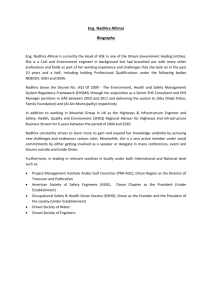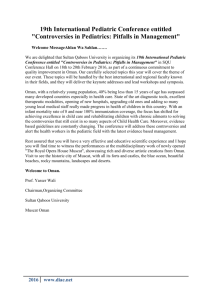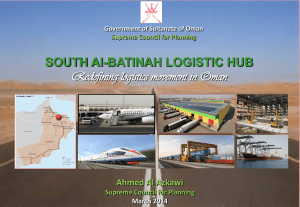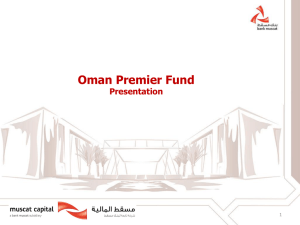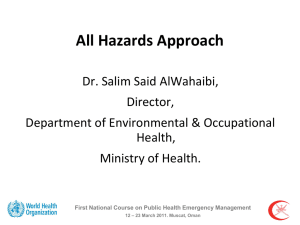Government of Sultanate of Oman
advertisement
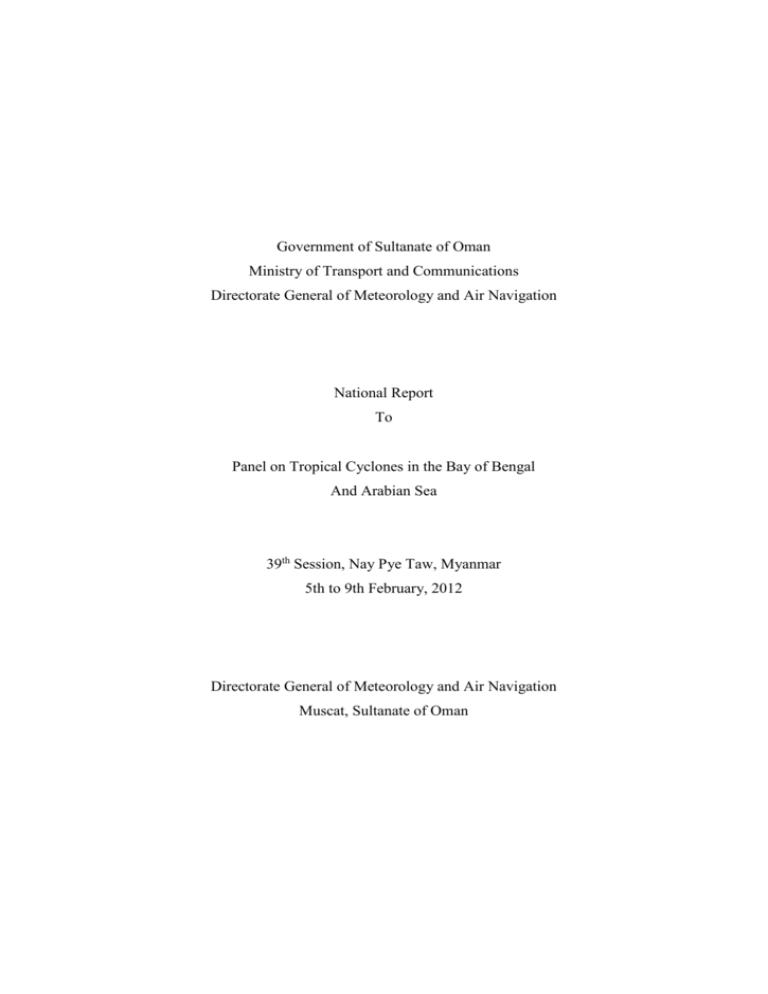
Government of Sultanate of Oman Ministry of Transport and Communications Directorate General of Meteorology and Air Navigation National Report To Panel on Tropical Cyclones in the Bay of Bengal And Arabian Sea 39th Session, Nay Pye Taw, Myanmar 5th to 9th February, 2012 Directorate General of Meteorology and Air Navigation Muscat, Sultanate of Oman Annual Report on Activities in Meteorology In the Sultanate of Oman During the year 2011 Review of the 2011 Cyclone Season 1. Meteorological Events 1.1. Cyclones There are two main seasons for tropical cyclone formation in the Arabian Sea. The 1st season is the Pre-monsoon season during May and June. The 2nd season is the post-monsoon season during October and November. There were no significant tropical disturbances to affect Oman in the first tropical cyclone season last year. However, Oman was affected by a series of three tropical systems within one month time in the second season as explained below. Consequently, the Main Forecasting Center in cooperation with National Committee for Civil Defense NCCD has issued a series of warnings to the public and fishermen. 1.2 Tropical storm ‘KEILA’ (29 October- 04 November, 2011) This system started as a cluster of thunderstorms associated with the ITCZ south east of the Arabian Sea in the last week of October. It gradually organized into a low pressure area on 27th of October. The low gained more intensity as it moved westward and was classified as a deep depression on October 29th. For a short while between 03-18 UTC on November 2nd, the classification was upgraded to a cyclonic storm by RSMS with 35 Kt estimated surface wind speed. However, Oman Met center kept the classification as a deep depression in accordance with available weather observations close to the center of the system. The system made landfall north of Salalah on November 2nd before weakening gradually. The highest surface wind speed recorded in Salalah ( very close to where Keila made landfall) on November 2nd was 23 kt only and the lowest recorded MSLP was 1000.5 hpa. The system brought moderate to heavy rains across the Sultanate causing the death of 12 people as well as a lot of property damage. It is interesting to note that there were no deaths reported in the southern part of the country where Keila made landfall. Instead, all the deaths occurred in the northern part of the country as the availability of moisture brought by Keila 2 triggered local thunderstorms over Al-hjir mountains which led to several flash flooding events. Figure 2 below shows total rainfall amounts recorded in Oman Met stations during the period between October 30th to 4th of November. The highest total rainfall amount during this period was in Noos Mountain near Salalah which recorded about 700 mm during this period as shown in Figure 2 below. The highest 24 hour total rainfall accumulation in Noos Mountain was about 400 mm on 3rd of November. Figure 1: Meteosat image of Keila taken on November 1st at 7:30 UTC. total rainfall from Oct 29th-Nov 4th ud ha B ibi D B ah u q id la um iya _N h H ew ai m a Ib ra M Job A a M M NA in as H a ir S ah al M alah us c N at i z Q w a a R Qir oo as n Al alh a H t aa d S S ai al q a S lah am U ai m l Za S u m r Y aim a J a lo ba on lN i us A lM Total rainfall 800 700 600 500 400 300 200 100 0 station Figure 2: Total Rainfall recorded in Oman Met stations from Oct 30th to Nov 4th 2011. 3 Figure 3 below shows the total rainfall accumulation during the period from October 27th until November 3rd using the TRMM product from Meteosat. It is very clear that Southern Oman received much more rain compared with the northern part. Ironically, all the deaths were reported in northern Oman as explained earlier. Figure 3: TRMM total rainfall accumulation during the period from October 27th until November 3rd 2011. Figure 4 below shows the track of Keila during the period from 29th October to 4th November, 2011. 4 Figure 4: Track of Keila over the Arabian Sea during the period from 29th October to 4th November, 2011 (courtesy of RSMC). 1.3 Deep Depression over the Arabian Sea (06- 10 November 2011) A low pressure formed over southeast Arabian Sea on 4th November 2011 in association with an active ITCZ. This low intensified into a depression on November 6th with 25 kt estimated surface wind speed around the center. The depression moved towards west-northwest direction and intensified further into a deep depression on November 8th. The approach of a westerly trough and relatively cold sea surface temperatures (26-28 C) did not allow the deep depression to intensify further and it weakened gradually on November 9th and 10th. Figure 5 below shows clearly how the system was vertically tilted on November 9th which led to its decay. 5 Figure 5: ASCAT winds indicating a separated low level circulation on November 9th. Figure 6 below shows the observed tack of this case. Figure 6: Track of the deep depression over the Arabian Sea during the period from 06-10 November 2011 (courtesy of RSMC). 6 Even though this deep depression did not make landfall, moderate to heavy rains and rough seas were reported as it moved closer to Oman coasts. However, there were no reports of any casualties. Figure 7 below shows the total rainfall amounts recorded in Oman during the period from 6-10 November 2011. The highest totals were recorded in Dukm and Mina Sultan Qaboos with rainfall total close to 40 mm. Rainfall from 6 Nov2011 to 10 Nov 2011 45 40 35 Rainfall "mm" 30 25 20 15 10 5 D uq Al A m ra t D ib um a _N ew Ib ra Kh as Jo ab b A a irp or t M a M jis as ir M in ah aS uQ M a us c Q at ai ro on R Qa as lh Al at H aa d Sa iq Sa m ai l Su r S U uwa m Za iq m ai Ya m lo on i 0 Station Figure 7: Total rainfall amounts recorded in Oman during the period from 6-10 November 2011. 7 1.4 Deep depression over the Arabian Sea (26 November to 1st December, 2011) A depression formed over the Comorian area on 26th of November and moved westnorthwestwards. It intensified further into a deep depression before it weakened gradually and dissipated near Oman Coast on 1st of December after encountering cold sea surface temperatures and increased vertical wind shear. The satellite image taken on 30th November in figure 8 below clearly shows the vertically tilted circulation which led to the gradual dissipation of the system. Figure 8: Meteosat satellite image taken on November 30th 2011. No rains were reported in Oman during this period. However, fishermen were warned about rough seas as the system approached Oman coasts. 8 Figure 9 below shows the track of this deep depression. Figure 9: Track of deep depression over the Arabian Sea during 26 N0vember01 December, 2011 (courtesy of RSMC). Review of the Coordinated Technical Plan 2 Meteorological Facilities 2.1 Upper Air Observation The Sultanate of Oman operates two upper air-observing stations, viz. Muscat (41256) and Salalah (41316). Both these are equipped with Vaisala’s Digicora GPS wind finding system. The radiosonde used is Visalla RS92 equipment. One flight is launched from each of these stations in a day. 2.2 Ship Weather Reports Weather Reports from Ships are received through GTS as well as from Muscat Coastal Radio Station. In addition Ship reports are also received from the Royal Oman Navy. 2.3 Wave Measurements 9 One wave radar measurement station was installed offshore of Qalhat (Sur)Oman liquid Gas Company-. Another two wave measurement stations located offshore of Sohar Station and Mina Salalah Station and the collected data is inserted on the GTS every three hours. One more stations will be added at Muscat. 2.4 Synoptic Land Stations There are a total of 39 meteorological stations out of which 23 are listed in the WMO’s Regional Basic Synoptic Network (RBSN) including 2 radiosonde stations and 12 Regional Basic Climatological Network (RBCN) stations out of which 3 are listed in Global Climate Observing System Surface Network. 2.5 Telecommunication All the meteorological stations operated by the Directorate General of Meteorology and Air Navigation (DGMAN) are connected to the MSS computer located at the Central Forecasting Office at Muscat International Airport by a reliable dial-up telephone link (Telephone lines and GSM Network). The MSS is connected to the RTH Jeddah by a dedicated link at 64 kbps based on TCP/IP protocol. In addition, a 4 Mbps Internet leased line has been established as well as for transmitting and receiving meteorological data with different meteorological centers such as New Delhi and Abu Dhabi. A bilateral Internet Circuit, which was established between these centers and the Directorate General of Meteorology and Air Navigation (DGMAN) for the exchange of meteorological data, has proved to be very effective, useful and most stable. Beside that, this connection is used to receive the boundary data initiated from the German weather service to be used for the Omani model. This connection have in it’s structure different servers as ftp server which is used for serving different users with special meteorological data. All these servers are protected by a firewall. 10 2.6 Satellite reception The Department installed Second Generation Satellite ground receiving station and the ground-receiving stations for intercepting High Resolution images from Polar Orbiting satellites operated by NOAA as well as from geostationary satellites operated by EUMETSAT. Also meteorological data are being received through Satellite distribution (SADIS) receiver. 2.7 Data Visualization 2.7.1 The Directorate General of Meteorology and Air Navigation (DGMAN) is using a visual weather application for visualizing the meteorological data and GRIB and BUFR format coded data. It is proved to be a useful tool for visualization, analyzing and forecasting the weather. 2.8 Computer Workstations 2.8.1 Data Processing System Global Numerical Weather Prediction NWP products are received via Internet, GTS, DWD Sat. We receive products from MDD, ECMWF, UK met office and German Weather Service DWD. Current processing capabilities consist of a PC Cluster of 72 nodes with total of 144 processors. Quad-coreAMD Opteron 3.2 is used for each node. This makes a total of 756 processing core. All nodes are connected via very fast Interconnection network using 144-port Infiniband switch with guarantees 3Gbps full duplex. 2.9 NWP Local Oman Regional Model ORM was established with the kind cooperation of National Weather Service of Germany DWD since 1999. The details of the model versions as follow: A] High Resolution Model HRM is Hydrostatic limited-area numerical weather prediction model for meso-α and meso-β. Main prognostic variables are: Surface pressure (ps), Temperature (T), Water vapour (qv) Cloud water (qc), Cloud ice (qi), Ozone (optional), Horizontal wind (u, v) and Several surface/soil parameters. More details are available (http://www.met.gov.om/hrm/index.php ). 11 on the model website DGMAN runs HRM with the following model resolutions: ORM_14: 14x14 km resolution. It covers the area between 30.0 E, 7.0 N (lower left corner) to 78.0E, 35.25 N (Upper right corner) with mesh size of 0.125 degree. There are 385x227 grid points and 40 vertical layers. The model is running on 10 nodes from the PC Cluster. It produces up to 120-h forecast at 00 and 12 UTC. The following figure shows the domain area. B] Consortium for Small-scale Modeling COSMO is a non-Hydrostatic limitedarea numerical weather prediction model for meso-α and meso-β. Main prognostic variables are: pressure perturbation (p‘), Temperature (T), specific humidity (qv) Cloud water (qc), Cloud ice (qi), Horizontal/virtical wind (u, v) and Several surface/soil parameters. More details are available on the model website (http://cosmo-model.cscs.ch ). DGMAN runs an operational version of COSMO model. It runs on 7x7 km covers the same domain of ORM_14 and 2.8km resolution covering Oman. COSMO was introduced to enhance the accuracy of predicting local rainfall over 12 Hajar Mountains and adjoining area during summer and to compare the forecast with the forecast of ORM_07. C] A WAM based wave model was established with the kind cooperation of GKSS of Germany, which covers the Arabian Sea, gulf of Oman and Arabian Sea. WAM model run of 14km resolution and nested into 3.5km resolution and it runs on 8 processors on the PC cluster. D] Tsunami Model for the Gulf of Oman and India Ocean: Comit Model from IOC is used to develop some hypothetical experiments to simulate tsunami waves propagation and indentation. 2.8.2 Module Output Statistics (MOS) The Directorate General of Meteorology and Air Navigation (DGMAN) successfully established a MOS based on HRM model at 7km resolution. MOS output is generated with each Model run. MOS is an approach to incorporate NWP forecasts information into statistical weather forecast. After installing MOS we noted improvement in Temperature and wind forecast. In addition we were able to get a probability forecast for thunderstorms and fog. 2.8.3 Verification Package The Directorate General of Meteorology and Air Navigation (DGMAN) managed successfully to develop its own verification package. The developed system verifies the continuous weather parameters such as T_2m, TD_2m and for the categorical weather parameters such as Total precipitation. The system generates different statistical scores such as Hit rate with a margin of error, Bias, Root Mean Squared Error (RMSE). The package provides a friendly UGI to allow the user to select different choices (Model type, stations list, observation time, weather element and statistical score) to be verified. This system will help find the systematic errors in the Model output, which can be tuned. The package is being in several countries such as UAE, Brazil, Jordan, Malaysia, Hungary, Vietnam, Iran, University of Berlin, Kenya and Madagascar. Panel Members may get a copy also if they request Oman's P.R. 2.9 Aeronautical Services 13 In order to meet ICAO recommended practices and to fulfill the requirements for Aviation the Directorate General of Meteorology and Air Navigation (DGMAN) installed a SADIS workstation as early as 1996. Effective few years, the department started to pay to the UK Met Office the annual contributions for obtaining SADIS data and Products. In addition all the SADIS data and products are also received thru an FTP Server from UK as a back up. A new service was also established for the provision of en-route flight folders for all Airlines operating in the Sultanate to be accessed on our web portal. Training and Research 3 Training and Research Oman hosts WMO 7th center of excellence for satellite training in cooperation with EUMETSAT. Panel members are welcome to participate in satellite training courses that will be held in the future. Other workshops, Seminars, Research and Training Courses attended by the Met personnel during the year 2011 were as follows:- Workshop/Seminar/Training Course Country No. of Persons PhD. In Climate change UK 1 PhD. In wind power Oman 1 PhD. In Network Oman 1 Master in Statistics Oman 1 Master in environment Oman 1 Masters in networking and programming Oman 2 EUMETSAT Satellite Application Course Oman 6 Met. Technician course (Class IV) Oman 22 Climate change seminar Turkey 2 Aviation course UK 2 TV graphics production Germany/ South 3 Africas Satellite application China 14 1 Satellite expert training Europe 1 database systems CLDB Slovakia 2 numerical weather forecasts Germany 3 programming languages Oman 4 Total 53 Meteorology Component Future Plans There are several goals that we plan to achieve in the near future. A network of 5 doppler radars is expected to be installed by the end of 2012. In addition, more land weather stations are planed to be installed across the Sultanate. Moreover, recruitment of new staff is going on to overcome the shortage of forecasters and observers in the department. DGMAN also plans to implement a Quality Management System (QMS) in the near future in order to comply with ICAO aviation requirements. Progress is also going on in establishing a multihazard early warning center that will be responsible to issue warnings for natural disasters such as Tsunamis and Tropical Cyclone. 15 HYDROLOGICAL COMPONENT 4 HYDROLOGICAL COMPONENT The Ministry of Regional Municipalities and Water Resources is responsible for the hydrological measurements and the management of the water resources for the Country. During the year 2011, a measurement of all hydrological parameters were measured through a network of 4681 monitoring stations. This network includes rain gauges, wadi gauges, flow peaks, aflaj, springs and water level in addition to 36 dams distributed all over the Sultanate. Rainfall There are 362 rain gauges, of which 277 Automatic and 85 of standard type. About 47 of these rainfall stations are fitted with telemetry using GSM modems. During the year 2011, the coastal areas of the country were exposed with exceptional rainfall as a result of Tropical depressions that affected Oman during the second tropical cyclone season in October and November. The maximum annual accumulated rainfall was 378 mm in Dhofar while in the east (Sharqiyah) 124 mm. The highest recorded in Muscat was176 mm and in the Interior region 256 mm was recorded at Nizwa . Wadi flow and floods There are 167 wadi gauge stations to measure wadi flow and to compute flood volumes. In addition, there are 25 stations to measure the peak height of the wadi flows. The year 2011 is considered one of the years where low discharge rates were recorded. The total flood volumes during 2011was estimated (190 Mm3) which is below the annual average (220 Mm3). The highest recorded was (284Mm3) in Dhofar region in the southern part of the country. Groundwater level measurements: The Ministry of Regional Municipalities & Water resources operate a network of 2107 groundwater wells measured for water levels, 1644 of them are measured every month and the rest are measured every three months. Analysis of data showed that as a result of the decrease in the recharge, there is a gradual decrease in water levels in most areas of the Sultanate, except Muscat and South Sharqiyah regions where recharge as a result of Cyclone Phet is still in progress. 16 Dams There are 3 types of Dams in Oman: 70 surface retention dams, 32 recharge dams and 12 Flood protection dams. On the 32 recharge dams stations for measuring flow and sedimentation, a total of 42 Mm3 was retained by recharge dams during 2011. In addition, the Wadi Dayqah sdam in Muscat regions stored a total of 14.6 Mm3. Events The Ministry arranged 3 main water resources related workshops and conferences during 2011: International Workshop on Hydrology, Nature and Engineering at the Sultan Qaboos University on 20th to 21st March 2011. World Water Day Seminar, 20-22 March, 2011 at the Sultan Qaboos University. International Conference on Drought Management Strategies in Arid and Semi-Arid Regions 11-14 December, 2011Muscat - Sultanate of Oman. Achievements: Some of the main Ministry achievements are listed below: The Ministry has completed 9 dams for groundwater recharge, flood protection and storage. In addition to that, there are 7 other dams under construction during this year. Several studies have been completed during last year that include the topics of dams construction, study of the increase groundwater level in some part of the country, study the water situation, drilling of exploration wells, rehabilitation of monitoring wells at Muscat area , wadi gauges and rain gauges affected by cyclone. 17 Training: The Ministry of Regional Municipalities and Water Resources is very keen in training the staff. During the year 2011, the Ministry arranged for both local and overseas training and workshops as follows: The training Program No. of Trainees Analysis of Rainfall gauge Data 15 Monitoring , processing and analysis of water Resource 18 Data Study and account of Floods and its impacts Direct & 16 indirect Method measurements Engineering and Technology of wells drilling 16 Geology of Oman 15 Future Plans The Ministry of Regional Municipalities and Water Resources is working on implementation of the five years plan starting from last year. The plan includes exploration of new water resources in the country through drilling. In addition, the plan includes construction of more dams to store water and recharge the groundwater aquifers. Moreover, the plan includes expansion of hydrological network and upgrade of automatic stations including the telemetry systems. The other Ministry plans include but not limited: Secure clean and safe drinking water. Reduce the water balance deficit. Implement water management policy, particularly in agriculture sector. Implement the Integrated Water Resources Management principles for sustainable water use. Protect water quality as a part of sustainable environmental approach. Encourage the investments in Non-Conventional water projects (Desalination and Wastewater treatment plants). 18 Oman Report on DPP 5. The DPP Component Regional Cooperation in DPP policies and strategies Oman is an active member on the recently inaugurated Gulf Cooperation Council Emergency Management Center (GCCEMC). As part of enhancing its national search and rescue capacity, Oman National Search and Rescue team is preparing to undergo INSARAG IEC this March and thus strongly encourages fellow PTC members to enhance their search and rescue capacities by adopting INSARAG methodology by which a common preparedness, mobilization, and operational standards are adopted by respective countries. Oman SRT is now ready for international deployment. Thus, member countries are encouraged to contact NCCD for any search and rescue response during disasters. During 2011, National Committee for Civil Defense (NCCD) has participated in various training programs pertaining to emergency and disaster risk reduction. Information Sharing NCCD is conducting a national Emergency Management Information system (SOEMIS) which is dedicated to enhance decision making for Disaster management and risk reduction. The system complies all GIS data and integrate it with an intelligent user friendly program that provide valid up to date information of about 90 layers of data covering all infrastructure, emergency services and other data that might be used during emergencies by all responding agencies/sectors. One product of such system is risk mapping. In cooperation with the hydrology and metrology authorities in Oman, risk maps are now being developed utilizing academic institutions capabilities. Public Awareness A dedicated working group was established that is tasked with develpoing a national disaster risk reduction awareness strategy. The PAWG is chaired by OESCC with members representing government, non government, and private sector in collaboration with international organizations. A national emergency simulation 19 center is under study. The center is going to be a public awareness tool that will contribute to Disaster risk reduction activities. Improve National Coordination NCCD established a sector that is dedicated to enhancing cooperation and coordination between early warning stakeholders. The EWS is tasked with improving coordination between NCCD and metrology, hydrology, seismic, and other early warning organization in the country. Meetings are held regularly and an action plan is the basis for their activities and programs. NCCD is working closely with the national Early warning system project in a joint technical committee that aims at enhancing coordination and communication during emergencies. The development of SOPs is one outcome of this program. Multi Hazard Management System NCCD has adopted a national functional multi hazard emergency management system. The system is based on the following principles: Disaster Risk Reduction is an integral component of the Emergency management system. Risk analysis is the basis for all emergency management activities. NGOs and Private Sector should be involved in emergency management from planning stage. Enhancing community capabilities in risk reduction and effective response. According to this system, eight sectors were established. Each sector was tasked of carrying a cretin function as follows: 1. Risk Analysis and Early warning Sector 2. Information and public awareness Sector 3. Search and Rescue Sector 4. Medical response and Public health Sector 5. Relief operations and shelter management Sector 20 6. Utilities and infrastructure Sector 7. CBRN Response Sector 8. DVI and victim affairs Sector Emergency Response Activities NCCD responded to tropical storms that affected parts of the country during November 2011. Effective early warning systems along with saturated public awareness activities were some of the most effect tools that resulted in reducing losses. Recommendations The importance of enhancing search and rescue capacities in member countries according to INSARAG methodology. The importance of enhancing communications and coordination during disaster between member countries. The importance of enhancing cooperation between country members in the field of training and joint exercises. Annual meeting followed by a workshop, training course, or exercise in emergency preparedness and response should be organized by the PTC DPPWG. ---END--- 21
